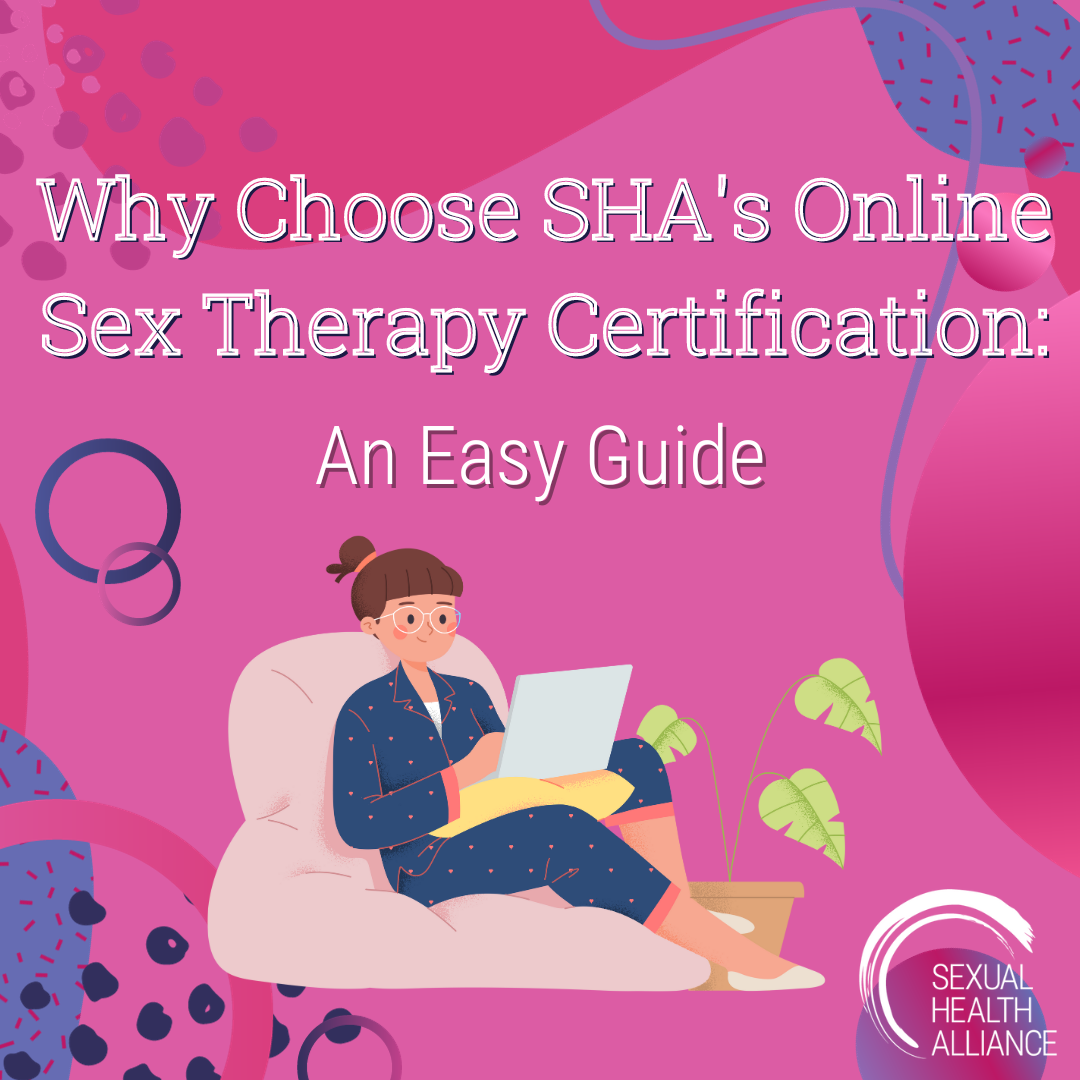SHA's online Sex Coach Certification is the first step to turning your passion into a profession.
Now Introducing: The SHAliday All-Access Pass!
Three Vexing Barriers to S-xuality Research
You might think the biggest barrier to s-x research is finding people who are willing to speak openly and honestly about their s-xuality. But while that is indeed an obstacle faced by sex researchers, they must first contend with several other issues before they can even focus on participants. Nevertheless, you can understand why so many barriers exist if you recognize how they stem from the same basis: the stigma surrounding s-xuality.
It would be easy to say that people should ignore the stigma around s-x, whether personally or professionally. However, ignoring stigma is not easy—or practical—when it has real consequences, as it so often does. You may have heard of teachers who have lost their jobs for supplementing their meager incomes with OnlyFans accounts or know k-nksters who are extremely careful about disclosing their interests for fear of professional or legal consequences. Along these same lines, s-xuality research faces other barriers that you might never have considered.
What They're Saying: Real Stories from Sexual Health Alliance Reviews
Kickstart Your Career: Learn About Sexuality Coach Certification
SHA's Sexuality Coach Certification is the game-changer you've been waiting for. This program is about gaining the tools, knowledge, and confidence to kickstart a fulfilling career in sexual health coaching.
Lost Voices: The Dangerous Implications of Book Bans
The American Library Association’s Office for Intellectual Freedom reports that between January 1st and August 31st, 2023, there were 695 attempts to censor library materials. These attempts challenged 1,915 pieces of literature. Comparing the same reporting period from 2022 to 2023 shows that there has been a 20% increase in book censorship. In fact, the American Library Association noted the 2022 reporting period as having the highest number of book challenges – challenges that have led to numerous book bans.
Censoring literature restricts the variety of stories available for everyone to read. Unfortunately, book challenges and bans target minority groups at a comparatively higher rate. Books hold power —a power that makes minority populations feel seen, accepted, and like they’re part of a community. With book bans targeting LGBTQIA+ communities at a startling rate, it’s critical for our society to fight for marginalized voices to be heard.
Why Choose SHA's Online Sex Therapy Certification: An Easy Guide
What is Chems-x?
Perhaps you may have stumbled across the all-too-familiar ads boasting about the unlimited hours s-x-enhancing pills like Viagra, the Pink Pussycat, and OLLY Lady Libido can do for s-x. Outside of these heavily marketed supplements, some people use psychedelics (such as LSD or ecstasy) and other drugs like methamphetamine to evoke the same feelings of better, longer lasting, and more fun s-x. The usage of drugs in the men-who-have-s-x-with-men (MSM) community is well documented, and the term chems-x has been used to name this practice.
Discourse has most often surrounded the negative implications of chems-x, such as the health consequences that can occur as a result of the combination of substances and s-x. Yet, almost every s-xual interaction has its share of pros and cons. Consisting of more than just substance use and health scares, chems-x is a multifaceted practice that, according to some practitioners, has the potential to emphasize pleasure, performance, and community.
Becoming a Certified Sex Therapist: Your Journey to Helping Others
Wishing You a Happy and Pleasurable National S-x Toy Day!
Wellness, pleasure, confidence, and excitement are a few of the many words we might use to describe our growing love affair with s-x toys—wouldn’t you say?
With more and more people understanding and embracing the benefits of prioritizing s-xual health, the s-x toy market in the U.S. alone has reached a value of 80.7 billion dollars in 2023. Moreover, the growing inclusivity of queer s-x toys and of s-x toys for persons with disabilities has revolutionized how pleasure is understood and experienced. This decreasing stigma along with the increase in accessibility of s-x toys have all helped put to a pin in our calendars to celebrate National S-x Toy Day on November 4th each year. The very existence of such a day is a divine reminder of self-love, care, pleasure, and body autonomy.
What Does F0replay Mean to You?
F!ngering. Dry-hump1ng. 0ral-s-x. Showering. N!pple play. All of these activities are usually considered f0replay in our society. How many times have we heard the argument that engaging in f0replay is essential to improving the experience of having s-x? F0replay usually has the reputation of being associated with patience, creativity, less pain, and a less penetrative or gen1tal-focused experience. But what is really behind the word “f0replay” and what do we associate with the act of f0replay?
Compulsory S-xuality: How Societal Pressure Affects S-xually Inexperienced Young Men
Compulsory sexuality assumes that all adults are sexually active and stigmatizes those who are sexually inexperienced or do not experience sexual attraction. As you cannot tell if someone has had sex just by looking at them, those who are seen as “virgins” can feel alone in their experience and internalize the associated shame and stigma.
Within the framework of compulsory sexuality, the social construct of virginity describes a virgin as someone who has not had penis-in-vagina (PIV) intercourse—a framework which is not inclusive of non-heterosexual sexual orientations and non-penetrative sex acts. The assumption that all adults are having sex can have harmful psychological effects, especially for asexual people who do not experience sexual attraction. However, compulsory sexuality can also be dangerous for young adults, specifically adult virgin men, who self-identify as involuntary celibates.
Navigating Sexuality Education Certification: Insights and Tips
Honoring Intersex Awareness Day
From a young age, many of us are taught to see the world in binary structures: love and hate, hot and cold, right or wrong. The list can go on and on. With any binary, though, there can be a grey area, forming something more like a spectrum.
In middle school s-x education, I was taught that boys are born with p-nises and girls are born with v-ginas. This too, is a binary that we’re taught to see. It wasn’t until later in life that I was taught there is also a spectrum when it comes to s-x traits. Learning that s-x traits aren’t binary opened a door for me in my education, and I’m hoping that on this Intersex Awareness Day, the door can be opened for you too.
Going Deeper Into Demisexuality
You’ve probably heard the phrase “sexuality is a spectrum,” right? Well, asexuality is no different. The broad spectrum of asexuality has been depicted as an umbrella, under which there are various orientations and nuances. Demisexuality is one significant component of what’s known as the Ace Spectrum: It provides identification for those who don’t quite fit within the bounds of asexuality (meaning people who don’t experience sexual attraction) yet also don’t navigate their sexuality along the path of allosexuality (which encompasses those who do experience consistent sexual attraction to others). This broad spectrum reminds us that sexuality really does vary widely among individuals.
Eroding Allonormativity During Ace Week and Beyond
Observed on the last full week of every October, Ace Week—formerly Asexuality Awareness Week—is a time to center the voices, perspectives, and experiences of the broad community of persons who identify anywhere along the asexual spectrum. It’s also a time for all of us—aces and especially allies—to commit to the conscious erosion of the odious dogmas of allonormativity.
Not sure what that means? You’re not alone: for many people, allonormativity is an unrecognized concept, though one still subtly smuggled into our day-to-day lives through cultural conditioning. Here, we’ll help you learn not only what it is, but also how you can identify it, name it, and join us in working toward diminishing the grasp it has on our culture at large.
Safety Tips for International F1sting Day
Today is International F1sting Day! To celebrate, we are going to have a look at what f1sting is and why we have an international day dedicated to it. F1sting has gotten a bad rap over the years for being a dangerous s-x act, but below we will suggest some ways to prevent injury whilst f1sting so that everyone involved can have fun and feel safe.
Happy Love Your Body Day!
Before, whenever I was surrounded by a multitude of people in any space—at a shopping mall or in a park—I found my brain taking notes on how different my body looked from the girl in the cherry boots or in a silky dress. Summer or winter: it didn’t matter how many layers of clothing someone wore. My brain automatically drew a chart of differences that exist in my body versus theirs.
Versus? Like a competition? Like there should be winners and losers? It always bewildered me. For decades now, unrealistic beauty standards have been heavily marketed and profited from by pushing forth an ideal body type that everyone is “expected” to achieve. In an attempt to fight such damaging expectations, the National Organization for Women founded Love Your Body Day in 2012.
A Pronoun Primer for International Pronouns Day
International Pronouns Day has been acknowledged on the third Wednesday of every October since 2018. It’s not just a time to share and reaffirm our pronouns, but also to continuing educating ourselves on the topic. Many of us are already well aware of the health risks that correlate with misgendering, but we might still lack comfort and confidence with some of the subtle nuances of both pronouns and discussions about them.
In that spirit, we’ve put together a short primer on some aspects of pronouns that you might still find yourself wondering about. And even if you’re familiar with everything below, you might consider passing it on to anyone else in your life who still finds themself struggling—or outright resistant.
Looking Back on SHA's Inaugural Sexological Conference
The S-xual Health Alliance has an ongoing goal of encouraging provocative dialogue and radical collaboration, and that sums up our first-ever S-xological Conference as well! Of course, this doesn’t come as a surprise, and I think the success of the event—centered around the science of s-x—is due to our wonderful participants and presenters, as well as host to Dr. Chris Donaghue and the SHA team.
Like all of SHA’s events, the S-xological Conference is geared toward professionals whose careers involve assisting clients with their s-x lives. Many attendees are therapists, although you’ll also commonly see social workers and s-x educators. Each event offers something for those who are just expanding their professional competencies in sexuality. Thanks to the multi-room format of this conference, which differs from previous events, participants could choose presentations to attend on Friday by heading to the appropriate (Zoom or physical) room. Like other events, a ticketing option included recordings for those who could not attend live in Denver.
























